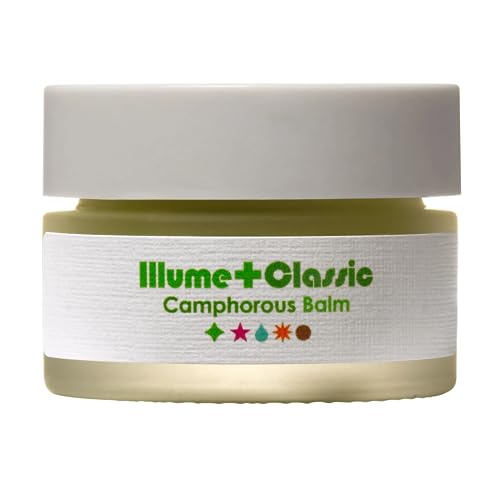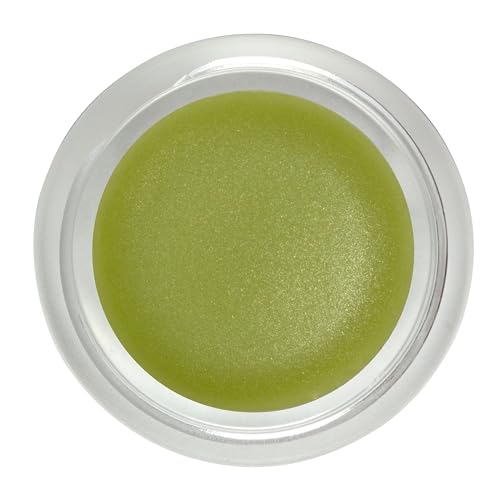

Living Libations Body Balm - Emollient Jojoba, Clarifying Essential Oils - 0.17oz


Rosmarinus Officinalis (Rosemary)
Medium RiskRosmarinus officinalis, commonly known as rosemary, is a herbaceous plant used in various cosmetic and personal care products for its aromatic properties and potential antioxidant effects. It is derived from unspecified preparations of the plant, primarily utilized for fragrance and preservation.
Sustai Insights
Rosemary offers functional benefits such as antimicrobial properties and natural fragrance. It is sustainably sourced and biodegradable. However, it poses moderate allergenic risks and may cause irritation in sensitive individuals. Regulatory bodies do not currently restrict its use, contributing to a medium overall risk assessment. Safe usage practices include patch testing for allergies, and alternatives may include synthetic fragrances or other natural extracts with fewer allergenic concerns.
Eucalyptus Globulus
Low RiskEucalyptus globulus, commonly known as eucalyptus, is a species of tree native to Australia. It is primarily used for its essential oil, which is known for its aromatic properties and potential applications in various products, including cosmetics and household cleaners.
Sustai Insights
Eucalyptus globulus offers functional benefits such as antimicrobial properties and acts as a natural fragrance in products. It is sustainably sourced and generally considered biodegradable. Health risks are minimal, with low concerns for carcinogenicity, allergies, and reproductive toxicity; however, it can cause skin and respiratory irritation. Environmental risks are low, with no significant pollutant or bioaccumulation concerns reported. Regulatory agencies have not issued any restrictions. Overall, the ingredient is assessed as low risk, with safe usage practices recommended and alternatives available for those sensitive to essential oils.
Simmondsia Chinensis (Jojoba)
Low RiskSimmondsia chinensis, commonly known as jojoba, is an oil derived from the seeds of the jojoba plant. It is commonly used in cosmetic formulations for its moisturizing properties, acting as an emollient and skin conditioning agent.
Sustai Insights
Jojoba oil offers functional benefits such as effective skin moisturization and is biodegradable, with sustainable sourcing practices. Health risks are low, with minimal concerns regarding carcinogenicity, allergies, and reproductive toxicity. Environmental impact is negligible, with no pollutant or bioaccumulation potential. Regulatory status is favorable with no significant restrictions noted. Overall, it is assessed as low risk, and safe usage practices should be maintained. Alternatives include other plant-derived oils like argan or almond oil, which may provide similar benefits.
Beeswax, Yellow
Low RiskBeeswax, yellow, is a natural wax produced by honeybees, primarily composed of esters of fatty acids and long-chain alcohols. It serves as an emulsifier, thickener, and stabilizer in cosmetic formulations, contributing to texture and consistency. It is commonly used in creams, balms, and lip products.
Sustai Insights
Beeswax provides functional benefits such as enhancing product texture and acting as a natural emulsifier, while also being biodegradable and sustainably sourced. Health risks are minimal, with low concerns for carcinogenicity, allergies, or irritations. Environmental impacts are also low, as it does not bioaccumulate. Regulatory status remains favorable with no current restrictions. Overall, the ingredient poses low risk, making it a suitable choice in cosmetic formulations.
Origanum Vulgare (Oregano)
Low RiskOriganum vulgare, commonly known as oregano, is a herbaceous plant used primarily for culinary purposes and as a natural remedy. It contains various bioactive compounds that contribute to its flavor and potential health benefits, making it a common ingredient in food products and dietary supplements.
Sustai Insights
Oregano offers functional benefits, including antioxidant and antimicrobial properties, and is often sustainably sourced. It poses low health risks, with no significant concerns regarding carcinogenicity, allergens, or reproductive toxicity. Environmentally, it is not considered a pollutant or bioaccumulative. Regulatory bodies do not list any warnings, indicating a low risk overall. Safe usage typically involves culinary applications, with alternatives such as thyme or basil available for similar flavor profiles.
Eucalyptus Globulus
Low RiskEucalyptus globulus, commonly known as eucalyptus, is a species of tree native to Australia. It is primarily used for its essential oil, which is known for its aromatic properties and potential applications in various products, including cosmetics and household cleaners.
Sustai Insights
Eucalyptus globulus offers functional benefits such as antimicrobial properties and acts as a natural fragrance in products. It is sustainably sourced and generally considered biodegradable. Health risks are minimal, with low concerns for carcinogenicity, allergies, and reproductive toxicity; however, it can cause skin and respiratory irritation. Environmental risks are low, with no significant pollutant or bioaccumulation concerns reported. Regulatory agencies have not issued any restrictions. Overall, the ingredient is assessed as low risk, with safe usage practices recommended and alternatives available for those sensitive to essential oils.
Simmondsia Chinensis (Jojoba)
Low RiskSimmondsia chinensis, commonly known as jojoba, is an oil derived from the seeds of the jojoba plant. It is commonly used in cosmetic formulations for its moisturizing properties, acting as an emollient and skin conditioning agent.
Sustai Insights
Jojoba oil offers functional benefits such as effective skin moisturization and is biodegradable, with sustainable sourcing practices. Health risks are low, with minimal concerns regarding carcinogenicity, allergies, and reproductive toxicity. Environmental impact is negligible, with no pollutant or bioaccumulation potential. Regulatory status is favorable with no significant restrictions noted. Overall, it is assessed as low risk, and safe usage practices should be maintained. Alternatives include other plant-derived oils like argan or almond oil, which may provide similar benefits.
Rosmarinus Officinalis (Rosemary)
Medium RiskRosmarinus officinalis, commonly known as rosemary, is a herbaceous plant used in various cosmetic and personal care products for its aromatic properties and potential antioxidant effects. It is derived from unspecified preparations of the plant, primarily utilized for fragrance and preservation.
Sustai Insights
Rosemary offers functional benefits such as antimicrobial properties and natural fragrance. It is sustainably sourced and biodegradable. However, it poses moderate allergenic risks and may cause irritation in sensitive individuals. Regulatory bodies do not currently restrict its use, contributing to a medium overall risk assessment. Safe usage practices include patch testing for allergies, and alternatives may include synthetic fragrances or other natural extracts with fewer allergenic concerns.
Beeswax, Yellow
Low RiskBeeswax, yellow, is a natural wax produced by honeybees, primarily composed of esters of fatty acids and long-chain alcohols. It serves as an emulsifier, thickener, and stabilizer in cosmetic formulations, contributing to texture and consistency. It is commonly used in creams, balms, and lip products.
Sustai Insights
Beeswax provides functional benefits such as enhancing product texture and acting as a natural emulsifier, while also being biodegradable and sustainably sourced. Health risks are minimal, with low concerns for carcinogenicity, allergies, or irritations. Environmental impacts are also low, as it does not bioaccumulate. Regulatory status remains favorable with no current restrictions. Overall, the ingredient poses low risk, making it a suitable choice in cosmetic formulations.
Origanum Vulgare (Oregano)
Low RiskOriganum vulgare, commonly known as oregano, is a herbaceous plant used primarily for culinary purposes and as a natural remedy. It contains various bioactive compounds that contribute to its flavor and potential health benefits, making it a common ingredient in food products and dietary supplements.
Sustai Insights
Oregano offers functional benefits, including antioxidant and antimicrobial properties, and is often sustainably sourced. It poses low health risks, with no significant concerns regarding carcinogenicity, allergens, or reproductive toxicity. Environmentally, it is not considered a pollutant or bioaccumulative. Regulatory bodies do not list any warnings, indicating a low risk overall. Safe usage typically involves culinary applications, with alternatives such as thyme or basil available for similar flavor profiles.
Discover the Living Libations Organic Illume Classic Camphorous Balm, your go-to solution for soothing hydration and natural comfort. This balm combines nourishing jojoba oil and happy beeswax to rejuvenate tired skin, promoting relaxation and vitality.
- Deep Hydration: Infused with emollient jojoba oil, this balm glides effortlessly onto your skin, locking in moisture to keep dryness at bay.
- Natural Ingredients: Crafted from organic, wildcrafted essences, it offers a clean beauty experience with no parabens, sulfates, or cruelty.
- Breathe Easy: With clarifying essential oils like eucalyptus and rosemary, it helps to clear your airways, enhancing your ability to breathe freely.
- Versatile Use: Perfect for daily application, this balm can be massaged into dry or irritated areas whenever needed for instant relief.
- Eco-Friendly Packaging: Bottled in recyclable glass, this product supports sustainability and minimizes environmental impact while caring for your skin.
Subscribe & Save with Sustai
- Best Price Guarantee: Always enjoy the lowest prices on sustainable home essentials.
- No Surprises: We’ll notify you before shipping. No hidden fees, ever.
- You’re in Charge: Change, pause, or cancel your subscription anytime with ease.
- Eco-Friendly Deliveries: Our grouped shipments mean less packaging and lower emissions.
Join us on a sustainable journey. Special offers for a limited time! Prices and promotions may change.
Recommended Products
Discover the Living Libations Organic Illume Classic Camphorous Balm, your go-to solution for soothing hydration and natural comfort. This balm combines nourishing jojoba oil and happy beeswax to rejuvenate tired skin, promoting relaxation and vitality.
- Deep Hydration: Infused with emollient jojoba oil, this balm glides effortlessly onto your skin, locking in moisture to keep dryness at bay.
- Natural Ingredients: Crafted from organic, wildcrafted essences, it offers a clean beauty experience with no parabens, sulfates, or cruelty.
- Breathe Easy: With clarifying essential oils like eucalyptus and rosemary, it helps to clear your airways, enhancing your ability to breathe freely.
- Versatile Use: Perfect for daily application, this balm can be massaged into dry or irritated areas whenever needed for instant relief.
- Eco-Friendly Packaging: Bottled in recyclable glass, this product supports sustainability and minimizes environmental impact while caring for your skin.

You can have at most 2 Sustainable Steals products in your cart
Customer Reviews
Customers’ View
Customers appreciate the soothing properties and natural formulation of the Body Balm by Living Libations. Many users highlight the emollient formula, noting that the combination of jojoba oil and beeswax provides effective hydration for dry or irritated skin. The essential oil blend, featuring clarifying camphorous essences, is frequently mentioned as promoting a calming atmosphere, making it a favorite for relaxation before sleep or during vocal activities. Additionally, the product's commitment to eco-friendly packaging and use of organic, wildcrafted ingredients resonates with environmentally conscious consumers. Overall, the Body Balm is viewed as a beneficial addition to personal care routines, aligning well with sustainable and health-focused values.
AI-generated from the text of customer reviewsThis product has no reviews yet.




